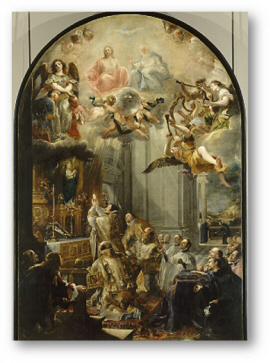|
At every Holy Sacrifice of the Mass let
us utter, from the depths of our being:
“I
die with Thee, O Christ on Calvary!”
How do I become Holy?
|
|
• “oppressive and sinful ‘structures’ in the world” • “inclusivism” • “language neutering” • “structural sin” • “collaborative ministry” • “oppressive patriarchal structures” • “social justice” (this comes with holiness, not before it) • “social and political activism” |
This is the language of the world, of liberal academia, of militant feminism, of “activism” — not of Christ. It is the language of those who detest the Church but remain within her for “a living”; it is the childish and neologistic ravings of dissident theologians and radical feminists (also making a living off the Church). They are “catholic” in being “universally” contemptible of the Church and Her teachings. They have left being “Catholic” long ago.
None of this will lead you to holiness. None of it.
Only Christ can. And He does:
|
• “If any man will come after me, let him deny himself,
and take up his cross daily, and follow Me.” (St. Luke
9.23) |
An Intimate Affair
Holiness is an intimate affair — between
you and God.
He does not ask you, anywhere in the Gospels, to change the world … but to change yourself — to take up your Cross and to follow Him ... not the world. 2
He is our paradigm of Holiness ... as is His Holy Mother Mary who gave us that beautiful, immemorial utterance, “Be it done to me according to thy word.” (St. Luke 1.37) In other words, as we said earlier, only conformity to the will of God — not the world — is the essence of holiness.
Imitate them. Not the world, just as Saint Paul did: “Imitate me, just as I also imitate Christ.” 3
Please God, let us now also say with Saint Paul, “I live, now not I; but Christ lives in me.” 4
Saint John, perhaps, sums it up best:
| “Love not the world, nor the things which are in the world. If any man love the world, the charity of the Father is not in him. For all that is in the world, is the concupiscence of the flesh, and the concupiscence of the eyes, and the pride of life, which is not of the Father, but is of the world. And the world passes away, and the concupiscence thereof: but he that doth the will of God, abides forever.” (1 John 2.15-17) |
Whom and what, then, will you follow if you seek to be holy? Christ or the world? It is absolutely clear that you cannot follow both. Each path diverges totally from the other, and the longer you remain on one path the farther you will be from the other.
Editor
Boston Catholic Journal
Comments? Write us: editor@boston-catholic-journal.com
_________________________________________________
1
https://www.dioceseofraleigh.org/news/view.aspx?id=1289
“Pope Benedict XVI leads an interfaith peace meeting in the Basilica
of St. Mary of the Angels in Assisi, Italy, Oct. 27. Pictured, from
left, are: Archbishop Norvan Zakarian of the Armenian Apostolic Church,
Anglican Archbishop Rowan Williams of Canterbury and Ecumenical Patriarch
Bartholomew of Constantinople, Pope Benedict, Rabbi David Rosen, representing
the chief rabbinate of Israel; Wande Abimbola, president of a Nigerian
institute that promotes the study of the culture and traditional religion
of the Yoruba people; and Shrivatsa Goswami, a Hindu delegate”.
https://www.foxnews.com/world/2011/10/27/rainbow-religious-leaders-join-pope-for-peace/
“ASSISI, Italy (AP) – “Pope Benedict XVI joined Buddhist monks, Islamic
scholars, Yoruba leaders and a handful of agnostics in making a communal
call for peace Thursday, insisting that religion must never be used
as a pretext for war or terrorism. Benedict welcomed some 300 leaders
representing a rainbow of faiths to the hilltop Italian town of Assisi
to commemorate the 25th anniversary of a daylong prayer for peace here
called by Pope John Paul II in 1986 amid Cold War conflicts.
Standing on the altar of St. Mary of the Angels basilica, Wande Abimbola
of Nigeria, representing Africa's traditional Yoruba religion, sang
and shook a percussion instrument as he told the delegates that peace
can only come with greater respect for indigenous religions.
"We must always remember that our own religion, along with the religions
practiced by other people, are valid and precious in the eyes of the
Almighty, who created all of us with such plural and different ways
of life and belief systems," he said.
https://www.zenit.org/en/articles/sant-egidio-founder-on-1986-assisi-meeting-of-religious-leaders
Blessed John Paul II, on the contrary, intuited the public force of
religions, despite secularization. He knew that religions could be attractive
to war-like passions. Worried about the cold war, he invited leaders
of Christian religions and other world religions to Assisi.
2
St. Matthew 4.8; St. Mark 4.19; St. Luke 4.5,
12.30; St. John 7.7, 14.17, 15.19, 16.33, 17.9, 17.14, 17.16; Gal. 6.14;
Colossians 2.8, 2.20; 2 St. Peter
1.4, 2.20; 1 St. John 2.15-17
3 I Cor. 11
4 Gal. 2.20
|
Totally
Faithful to the Sacred Deposit of Faith entrusted
to the Holy See in Rome
“Scio
opera tua ... quia modicum habes virtutem, et servasti verbum
Meum, nec non negasti Nomen Meum”
Copyright © 2004 - 2026 Boston
Catholic Journal. All rights reserved. Unless otherwise
stated, permission is granted by the Boston Catholic Journal
for the copying and distribution of the articles and audio
files under the following conditions: No additions,
deletions, or changes are to be made to the text or audio
files in any way, and the copies may not be sold for a profit.
In the reproduction, in any format of any image, graphic,
text, or audio file, attribution must be given to the Boston
Catholic Journal. |






















